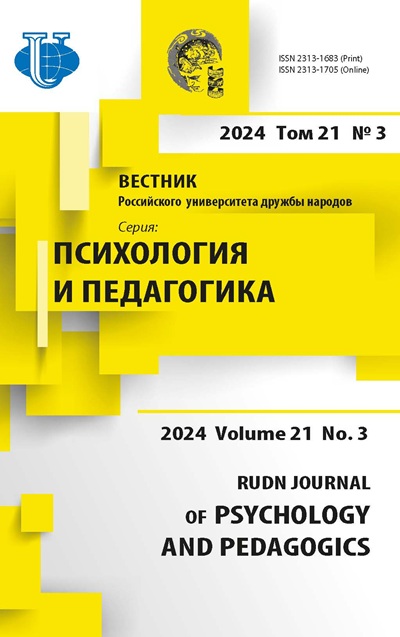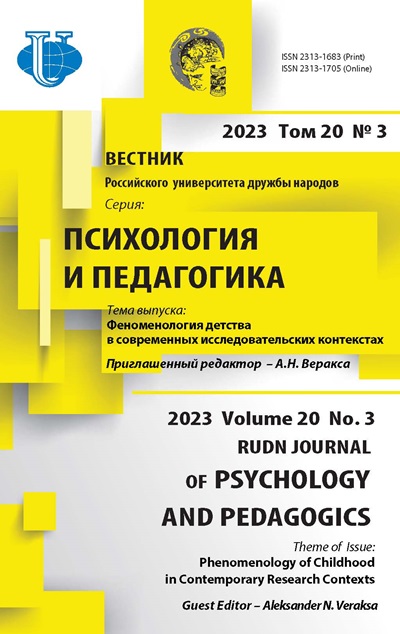Social Competence of Adolescents: The Role of Social Cognition and Behavior Control
- Authors: Vilenskaya G.A.1, Lebedeva E.I.1, Ulanova A.Y.1
-
Affiliations:
- Institute of Psychology of the Russian Academy of Sciences
- Issue: Vol 20, No 3 (2023): Phenomenology of Childhood in Contemporary Research Contexts
- Pages: 588-608
- Section: SOCIAL DEVELOPMENT IN ADOLESCENCE
- URL: https://journals.rudn.ru/psychology-pedagogics/article/view/36966
- DOI: https://doi.org/10.22363/2313-1683-2023-20-3-588-608
- EDN: https://elibrary.ru/AFJGKP
Cite item
Full Text
Abstract
Social competence during adolescence plays a crucial role in socialization and psychological well-being. Available data suggest that social cognition (theory of mind, ToM) and self-regulation (behavioral control) abilities make a significant contribution to social competence at a young age, but research on their role in adolescence is still limited. The purpose of the research is to study the role of behavior control and ToM in the social competence of adolescents. The study involved 106 6-8-grade students (girls - 51), aged 12-15 years ( Me = 13, SD = 0.87). The BRIEF questionnaire was used to assess their behavior control; ToM was assessed using tasks for understanding high-order false beliefs. For external assessment of the social competence of the participants, a questionnaire for teachers and a sociometric method were used. The groups of the adolescents, divided by the median criterion, were compared using the overall BRIEF regulation index and the total score for false-belief understanding. The most salient differences in the teachers’ and peers’ assessments of the social competence were found between the contrasting groups of the participants, i.e., with high levels of ToM and behavior control and with low levels of these abilities. At the same time, differences in the teachers’ assessments were observed for both positive and negative assessments but, in sociometric indices, only for negative ones. The teachers considered the adolescents with high levels of behavior control to be more socially competent, regardless of their level of social cognition. For the peers, the level of behavioral control mattered only when the ability to assess the mental states of other people was weak. The results of our study show the importance of the role of social cognition and behavioral control in the implementation of socially competent behavior in adolescents. At the same time, the data obtained indicate the heterogeneity of the contribution of these abilities to the social competence of adolescents assessed by peers and teachers.
About the authors
Galina A. Vilenskaya
Institute of Psychology of the Russian Academy of Sciences
Author for correspondence.
Email: vga2001@mail.ru
ORCID iD: 0000-0002-6089-155X
Ph.D. in Psychology, is Leading Researcher, Laboratory of Psychology of Subject Development in Normal and Post-Traumatic Conditions
13 Yaroslavskaya St, bldg 1, Moscow, 129366, Russian FederationEvgenia I. Lebedeva
Institute of Psychology of the Russian Academy of Sciences
Email: evlebedeva@yandex.ru
ORCID iD: 0000-0002-0888-8273
Ph.D. in Psychology, is Senior Researcher, Laboratory of Psychology of Subject Development in Normal and Post-Traumatic States
13 Yaroslavskaya St, bldg 1, Moscow, 129366, Russian FederationAnna Yu. Ulanova
Institute of Psychology of the Russian Academy of Sciences
Email: rachugina@gmail.com
ORCID iD: 0000-0002-8757-0916
Ph.D. in Psychology, is Senior Researcher, Laboratory of Psychology of Subject Development in Normal and Post-Traumatic States
13 Yaroslavskaya St, bldg 1, Moscow, 129366, Russian FederationReferences
- Anderson, P.J. (2008). Towards a developmental model of executive function. In V. Anderson, R. Jacobs & P.J. Anderson (Eds.), Executive Functions and the Frontal Lobes: A Lifespan Perspective (pp. 3–21). New York: Psychology Press. https://doi.org/10.4324/9780203837863
- Argyle, M. (1999). Causes and correlates of happiness. In D. Kahneman, E. Diener & N. Schwarz (Eds.), Well-Being: The Foundations of Hedonic Psychology (pp. 353–373). New York: Russell Sage Foundation.
- Belickaja, G.Je. (1995). Social competence of the person. In K.A. Abulhanova-Slavskaja, A.V. Brushlinskij & M.I. Volovikova (Eds.), Consciousness of the Person in a Crisis Society (pp. 42–57). Moscow: Institute of Psychology of RAS. (In Russ.)
- Bierman, K.L., Nix, R.L., Greenberg, M.T., Blair, C., & Domitrovich, C.E. (2008). Executive functions and school readiness intervention: Impact, moderation, and mediation in the Head Start REDI program. Development and Psychopathology, 20(3), 821–843. https://doi.org/10.1017/s0954579408000394
- Bock, A.M., Gallaway, K.C., & Hund, A.M. (2015). Specifying links between executive functioning and theory of mind during middle childhood: Cognitive flexibility predicts social understanding. Journal of Cognition and Development, 16(3), 509–521. https://doi.org/10.1080/15248372.2014.888350
- Bosacki, S., & Astington, J.W. (2001). Theory of mind in preadolescence: Relations between social understanding and social competence. Social Development, 8(2), 237–255. https://doi.org/10.1111/1467-9507.00093
- Clark, C., Prior, M., & Kinsella, G. (2002). The relationship between executive function abilities, adaptive behaviour, and academic achievement in children with externalising behaviour problems. Journal of Child Psychology and Psychiatry, 43(6), 785–796. https://doi.org/10.1111/1469-7610.00084
- Crick, N.R., & Dodge, K.A. (1994). A review and reformulation of social information-processing mechanisms in children's social adjustment. Psychological Bulletin, 115(1), 74–101. https://doi.org/10.1037/0033-2909.115.1.74
- Devine, R.T., White, N., Ensor, R., & Hughes, C. (2016). Theory of mind in middle childhood: Longitudinal associations with executive function and social competence. Developmental Psychology, 52(5), 758–771. https://doi.org/10.1037/dev0000105
- Dubrovina, O.I. (2009). Psychological foundations of professional and social competencies. PhD Thesis Abstract. Ekaterinburg: Ural State University. (In Russ.)
- Ferguson, H.J., Brunsdon, V.E.A., & Bradford, E.E.F. (2021). The developmental trajectories of executive function from adolescence to old age. Scientific Reports, 11(1), 1382. https://doi.org/10.1038/s41598-020-80866-1
- Gartvik, Ye.V. (2020). The ratio of the mental and delinquent model of adolescent behaviour. Vestnik of Kostroma State University. Series: Pedagogy. Psychology. Sociokinetics, 26(3), 73–78. (In Russ.) https://doi.org/10.34216/2073-1426-2020-26-3-73-78
- Gioia, G.A., Isquith, P.K., Guy, S.C., & Kenworthy, L. (2000). BRIEF: Behavior Rating Inventory of Executive Function. Lutz, FL: Psychological Assessment Resources, Inc.
- Gomez-Garibello, C., & Talwar, V. (2015). Can you read my mind? Age as a moderator in the relationship between theory of mind and relational aggression. International Journal of Behavioral Development, 39(6), 552–559. https://doi.org/10.1177/0165025415580805
- Gorina, E.Ju., & Ahutina, T.V. (Eds.). (2019). BRIEF Behavior Rating Inventory. Moscow: Terevinf Publ. (In Russ.)
- Imuta, K., Henry, J.D., Slaughter, V., Selcuk, B., & Ruffman, T. (2016). Theory of mind and prosocial behavior in childhood: A meta-analytic review. Developmental Psychology, 52(8), 1192–1205. https://doi.org/10.1037/dev0000140
- Isquith, P.K., Roth, R.M., Kenworthy, L., & Gioia, G. (2014). Contribution of rating scales to intervention for executive dysfunction. Applied Neuropsychology: Child, 3(3), 197–204. https://doi.org/10.1080/21622965.2013.870014
- Ivaniushina, V.A., Titkova, V.V., & Alexandrov, D.A. (2016). Adolescent aggression: Group norms and social status among peers. Sociological Journal, 22(1), 54–71. (In Russ.) https://doi.org/10.19181/socjour.2016.22.1.1294
- Jacobson, L.A., Williford, A.P., & Pianta, R.C. (2011). The role of executive function in children's competent adjustment to middle school. Child Neuropsychology, 17(3), 255–280. https://doi.org/10.1080/09297049.2010.535654
- Junge, C., Valkenburg, P.M., Deković, M., & Branje, S. (2020). The building blocks of social competence: Contributions of the consortium of individual development. Developmental Cognitive Neuroscience, 45, 100861. https://doi.org/10.1016/j.dcn.2020.100861
- Laursen, B., & Veenstra, R. (2021). Toward understanding the functions of peer influence: A summary and synthesis of recent empirical research. Journal of Research on Adolescence, 31(4), 889–907. https://doi.org/10.1111/jora.12606
- Lebedeva, E.I., Vilenskaya, G.A., Ulanova, A.Yu., Filippu, O.Yu., & Pavlova, N.S. (2023). Social competence in adolescents with different level of theory of mind. Psikhologicheskii Zhurnal, 44(1), 43–52. (In Russ.) https://doi.org/10.31857/S020595920024342-2
- Liddle, B., & Nettle, D. (2006). Higher-order theory of mind and social competence in school-age children. Journal of Cultural and Evolutionary Psychology, 4(3‒4), 231–244. https://doi.org/10.1556/jcep.4.2006.3-4.3
- Maslova, I.A. (2007). Socialization of an adolescent in the educational space of an institution of additional education for children. Ph.D. in Pedagogy Thesis Abstract. Magnitogorsk: Magnitogorsk State Technical University. (In Russ.)
- Masten, A.S., Herbers, J.E., Desjardins, C.D., Cutuli, J.J., McCormick, C.M., Sapienza, J.K., Long, J.D., & Zelazo, P.D. (2012). Executive function skills and school success in young children experiencing homelessness. Educational Researcher, 41(9), 375–384. https://doi.org/10.3102/0013189x12459883
- Meinhardt‐Injac, B., Daum, M.M., & Meinhardt, G. (2020). Theory of mind development from adolescence to adulthood: Testing the two‐component model. British Journal of Developmental Psychology, 38(2), 289–303. https://doi.org/10.1111/bjdp.12320
- Miller, S.E., Reavis, R.E., & Avila, B.N. (2018). Associations between theory of mind, executive function, and friendship quality in middle childhood. Merrill-Palmer Quarterly, 64(3), 397–426. https://doi.org/10.13110/merrpalmquar1982.64.3.0397
- O’Toole, S.E., Monks, C.P., & Tsermentseli, S. (2017). Executive function and theory of mind as predictors of aggressive and prosocial behavior and peer acceptance in early childhood. Social Development, 26(4), 907–920. https://doi.org/10.1111/sode.12231
- Raaijmakers, M.A.J., Smidts, D.P., Sergeant, J.A., Maassen, G.H., Posthumus, J.A., van Engeland, H., & Matthys, W. (2008). Executive functions in preschool children with aggressive behavior: Impairments in inhibitory control. Journal of Abnormal Child Psychology, 36(7), 1097–1107. https://doi.org/10.1007/s10802-008-9235-7
- Razza, R.A., & Blair, C. (2009). Associations among false-belief understanding, executive function, and social competence: A longitudinal analysis. Journal of Applied Developmental Psychology, 30(3), 332–343. https://doi.org/10.1016/j.appdev.2008.12.020
- Repacholi, B., Slaughter, V., Pritchard, M., & Gibbs, V. (2003). Theory of mind, Machiavellianism, and social functioning in childhood. In B. Repacholi & V. Slaughter (Eds.), Individual Differences in Theory of Mind: Implications for Typical and Atypical Development (pp. 67–97). New York: Psychology Press. https://doi.org/10.4324/9780203488508
- Rose-Krasnor, L. (1997). The nature of social competence: A theoretical review. Social Development, 6(1), 111–135. https://doi.org/10.1111/j.1467-9507.1997.tb00097.x
- Schultz, D., Izard, C.E., Stapleton, L.M., Buckingham-Howes, S., & Bear, G.A. (2009). Children's social status as a function of emotionality and attention control. Journal of Applied Developmental Psychology, 30(2), 169–181. https://doi.org/10.1016/j.appdev.2008.12.002
- Sergienko, E.A. (2018). Behaviour control as the basis of self-regulation. South-Russian Journal of Social Sciences, 19(4), 130–146. (In Russ.) https://doi.org/10.31429/26190567-19-4-130-146
- Sergienko, E.A., & Vilenskaya, G.A. (2018). Behavioral control ‒ integrative concept of mental regulation. In A.L. Zhuravlev & E.A. Sergienko (Eds.), The Development of the Concepts of Contemporary Psychology (pp. 343–378). Moscow: Institute of Psychology of RAS. (In Russ.)
- Serjakova, S.B., & Galakova, O.V. (2013). Social competence of primary schoolchildren. Development in extracurricular activities. Saarbruecken: LAP Lambert Academic Publishing. (In Russ.)
- Slaughter, V., Imuta, K., Peterson, C.C., & Henry, J.D. (2015). Meta-analysis of theory of mind and peer popularity in the preschool and early school years. Child Development, 86(4), 1159–1174. https://doi.org/10.1111/cdev.12372
- Smith, P.K. (2017). Bullying and theory of mind: A review. Current Psychiatry Reviews, 13(2), 90–95. https://doi.org/10.2174/1573400513666170502123214
- Stump, K.N., Ratliff, J.M., Wu, Y.P., & Hawley, P.H. (2009). Theories of social competence from the top-down to the bottom-up: A case for considering foundational human needs. In J.L. Matson (Ed.), Social Behavior and Skills in Children (pp. 23–37). New York: Springer. https://doi.org/10.1007/978-1-4419-0234-4_2
- Titkova, V.V., Ivaniushina, V.A., & Alexandrov, D.A. (2017). Smart, pretty or independent: Who is popular at school? Educational Studies Moscow, (4), 171–198. (In Russ.) https://doi.org/10.17323/1814-9545-2017-4-171-198
- Van den Berg, Y.H.M., Lansu, T.A.M., & Cillessen, A.H.N. (2020). Preference and popularity as distinct forms of status: A meta‐analytic review of 20 years of research. Journal of Adolescence, 84(1), 78–95. https://doi.org/10.1016/j.adolescence.2020.07.010
- Van der Graaff, J., Carlo, G., Crocetti, E., Koot, H.M., & Branje, S. (2018). Prosocial behavior in adolescence: Gender differences in development and links with empathy. Journal of Youth and Adolescence, 47(5), 1086–1099. https://doi.org/10.1007/s10964-017-0786-1
- Vilenskaya, G.A., & Lebedeva, E.I. (2014). The development of the understanding of mental world and the behavioural control in preschool age. Psychological Studies, 7(38), 5. (In Russ.) https://doi.org/10.54359/ps.v7i38.587
- Weimer, A.A., Warnell, K.R., Ettekal, I., Cartwright, K.B., Guajardo, N.R., & Liew, J. (2021). Correlates and antecedents of theory of mind development during middle childhood and adolescence: An integrated model. Developmental Review, 59, 100945. https://doi.org/10.1016/j.dr.2020.100945
- Wilson, J., Hogan, C., Wang, S., Andrews, G., & Shum, D.H.K. (2021). Relations between executive functions, theory of mind, and functional outcomes in middle childhood. Developmental Neuropsychology, 46(7), 518–536. https://doi.org/10.1080/87565641.2021.1988086
- Yudina, T.A., & Alekhina, S.V. (2022). On the problem of evidence-based psychological assessment of school students’ social competence in inclusive education. Journal of Modern Foreign Psychology, 11(4), 41–50. (In Russ.) https://doi.org/10.17759/jmfp.2022110404
- Zelazo, P.D., & Müller, U. (2002). Executive function in typical and atypical development. In U. Goswami (Ed.), Blackwell Handbook of Childhood Cognitive Development (pp. 445–469). Malden, MA: Blackwell Publishers Ltd. https://doi.org/10.1002/9780470996652.ch20
- Zorza, J.P., Marino, J., & Acosta Mesas, A. (2016). Executive functions as predictors of school performance and social relationships: Primary and secondary school students. The Spanish Journal of Psychology, 19, E23. https://doi.org/10.1017/sjp.2016.23
- Zorza, J.P., Marino, J., de Lemus, S., & Acosta Mesas, A. (2013). Academic performance and social competence of adolescents: Predictions based on effortful control and empathy. The Spanish Journal of Psychology, 16, E87. https://doi.org/10.1017/sjp.2013.87
















